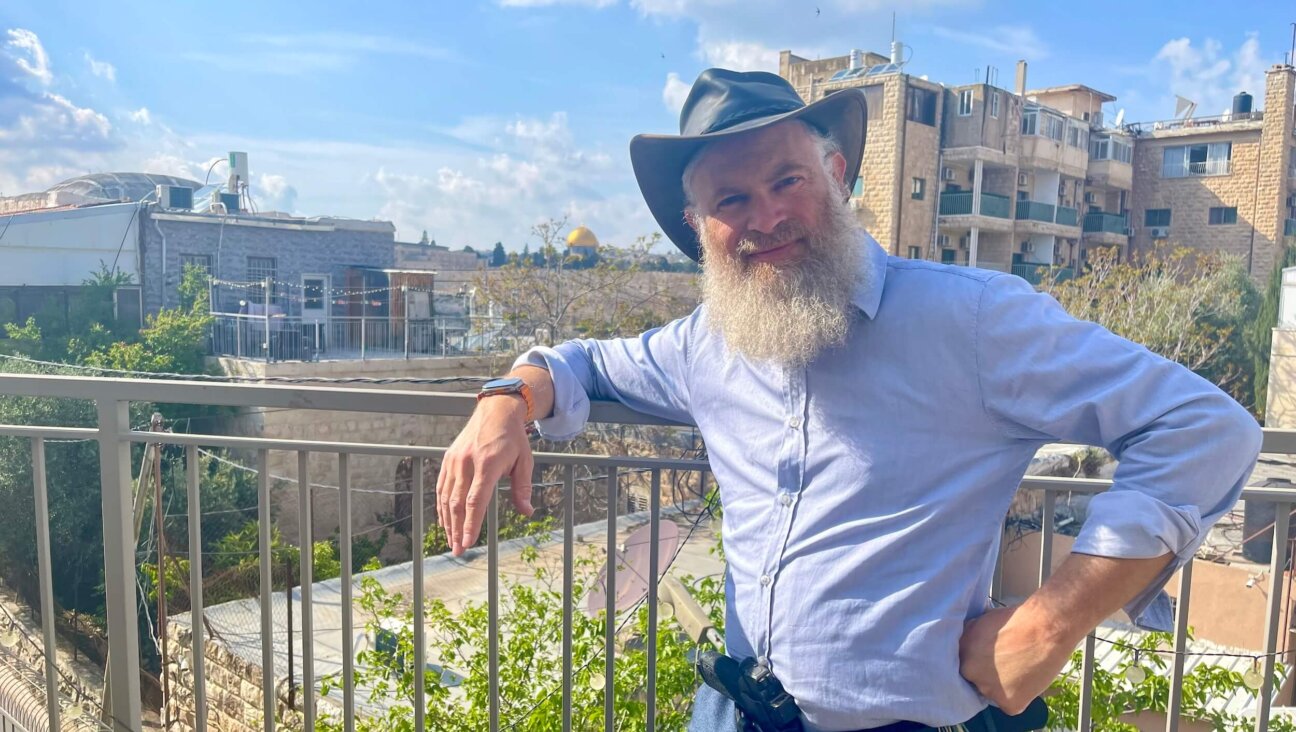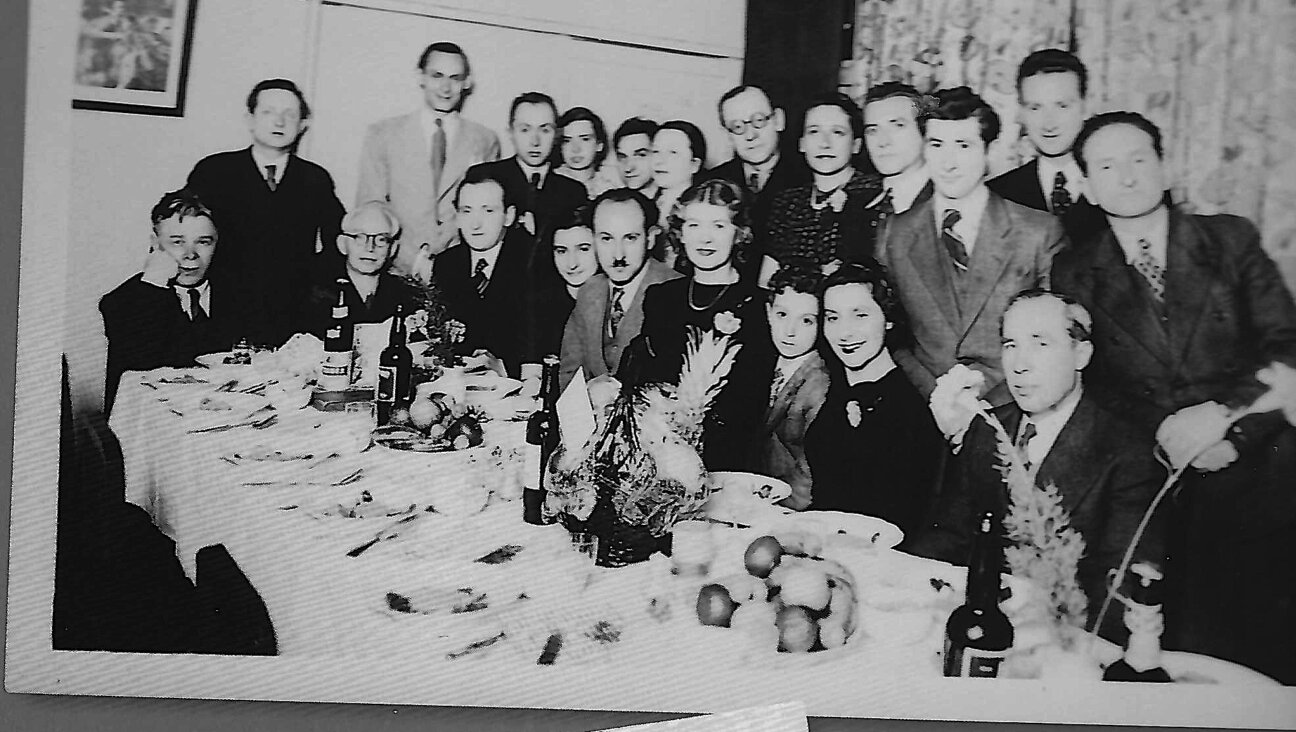Ugandan Jews’ Hopes Rise With New Chief Rabbi

TOP OF THE HILL: Gershom Sizomu (center) steps into the rabbinate, accompanied by his mother and brother.
Nabugoye Hill, Uganda – Atop Nabugoye Hill, I joined 1,500 sojourners in the flower-filled green of Eastern Uganda, among banana plantations, maize fields, mango trees and drooping jackfruit.

TOP OF THE HILL: Gershom Sizomu (center) steps into the rabbinate, accompanied by his mother and brother.
The crowd was there, overlooking the Mount Elgon foothills, to witness the installation ceremony of Rabbi Gershom Sizomu, who, serenaded by drum and dance ensembles, took his place as the first sub-Saharan African rabbi of the Abayudaya (Lugandan for “Children of Judah”) and chief rabbi of Uganda.
Joined by his wife Tzipporah, and their three children, Igaal, Daphna and Navah, Sizomu spent the past five years in the United States as a student at American Jewish University’s Ziegler School of Rabbinic Studies in Los Angeles, where he trained to become a Conservative rabbi. Following his ordination this past May in the United States, Sizomu returned home to Nabugoye Hill to serve the 89-year-old Abayudaya community, founded in 1919 by Semei Kakungulu, a local military leader and renowned elephant hunter.
Many Abayudaya members said they are confident that having an “official” rabbi will help them gain greater acceptance by the global Jewish community. Among them is Moses Sebagabo, born and raised on Nabugoye Hill. Sebagabo described Sizomu’s installation as a “unifying moment” offering “new potential to grow and learn.” Sebagabo is married with two children and holds a law degree, but he dreams of someday becoming a rabbi.
“I want to judge people equally,” Sebagabo explained, “and this I can do only with Torah. I want to use Torah to better the world.”
With five synagogues in Uganda — three of which are little more than mud huts — and a yeshiva that is currently being built, Sebagabo hopes to join Sizomu as part of a rabbinic team. Should funding become available, Sebagabo hopes to follow Sizomu’s lead to become the second member of the Abuydaya to receive formal rabbinic training outside Uganda.
Semei Kakungulu, founder of the Abayudaya community, was originally a Christian, but he became unconvinced by the teachings of the New Testament. He resisted the influence of surrounding Christian missionaries and began leading a Jewish life. Kakungulu and his 3,000 followers lived in the region as sustenance farmers, adopting the Jewish dietary practices, observance of the Sabbath and circumcision, all of which they learned from a Jewish visitor from Jerusalem who stayed with the community for six months in the 1920s. Nearly half a century later, Uganda’s oppressive military regimes of the 1960s and ’70s outlawed Judaism, shrinking the Abayudaya to a mere 300. Yet, the hill and its people survived.
Today, with a population estimated at 900 to 1,050, Nabugoye Hill has erected two Jewish schools open to Abayudaya children as well as to neighboring Muslims and Christians. At its base sits the refuah sh’leima health clinic bordered by the Moses Synagogue, where the glow of Sabbath candles illuminates lizards on the stucco sanctuary walls, and where prayer is a fusion of Hebrew and Luganda, ringing with harmonies, drumming, and ululating shrills.
The past few decades have yielded a growing relationship between the Abayudaya and the American Jewish community. Organizations such as Kulanu, based in New York City, have helped the Abayudaya grow —from commissioning the community’s first running water system, to constructing new classrooms, to developing a public health education program. The American-Abayudaya relationship further evolved in 2002, when a group of Conservative rabbis and rabbinical students visited Nabugoye Hill to establish rabbinical courts and officially convert the Abayudaya to Judaism in the absence of concrete ancestral ties. More than half the community underwent the practice, complete with a ritual bath in the synagogue’s mikveh, a pool in the middle of a cornfield.
Now, six years later, Sizomu’s homecoming marks a new wave of change for the community. After a succession of self-taught spiritual leaders — among them, Sizomu’s father, grandfather and Sizomu himself — Sizomu is the first to receive formal rabbinic training, bringing the Abayudaya to deeper contact with Western Judaism.
“I return to Nabugoye Hill with the powerful responsibility to share my knowledge and help our Jewish community grow more learned,” Sizomu said during the ceremony. “I am committed to advancing educational opportunities for my fellow brothers and sisters, and I thank you for accepting my leadership.”
The installation began with lively entertainment from indigenous song-and-dance troupes comprising Abayudaya children; Muslim and Christian singers, and orphaned, AIDS-afflicted adolescents. The Ugandan national anthem and “HaTikvah” followed the performances. Rabbi Bradley Shavit Artson, American Jewish University’s dean of the Ziegler School of Rabbinic Studies, offered a welcome speech followed by remarks from Ugandan government officials. Two kilometers from a pit once used by the Abayudaya to ferment bananas for Sabbath wine, Rabbi Richard Camras, Sizomu’s personal mentor and rabbi of Shomrei Torah Synagogue in West Hills, Calif., led a Kiddush ceremony and the recitation of the Kohanic priestly blessings.
Where I sat, to my right, was a row of local imams from neighboring Muslim communities; the imams wore long white robes. To my left were the dignified matriarchal figures of the Abayudaya, wearing cranberry- and lime-colored dresses with puffed sleeves and patterned headscarves. An arm’s length away, American Jewish volunteers met the gazes of Ugandan dignitaries as Israeli backpackers plunked their gear in the grass.
Perhaps the most notable attendees were the world’s newest Jews, from Nigeria, Ghana, Kenya and Tanzania. Twenty-four hours earlier, these Africans, along with 250 others, stood in front of a beit din (rabbinical court) — upon which Sizomu sat — to undergo Jewish conversions officiated by Conservative rabbis from the United States. These Africans have studied and lived as Jews for quite some time. Excited by Sizomu’s return to Africa, and with the expectation that his knowledge will both strengthen and expand pan-African Jewry, many “new” African Jews traveled great distances to attend Sizomu’s installation.
Conservative Judaism’s encounter with the Abayudaya unearths a slew of questions concerning the mixing of culture with ritual practice and theological interpretation. In a community in which women have, traditionally, neither chanted from the Torah nor led services, what will it mean to have a rabbi ordained by a movement in which women’s religious leadership is welcome? In a community in which instrumental music is an essential part of prayer, what will it mean for a community to embrace the rabbinic leadership of Sizomu who, in recent years, has come to know its absence?
As Judaism takes a stronger hold in Africa, there is likely more history to be made on Nabugoye Hill and on other hills in the sub-Saharan communities where newly converted African Jews returned after Sizomu’s installation.
“How does this feel for you?” I asked Natan, a Nigerian Jew who taught me new melodies and a special additional prayer to say during Havdalah, the ceremony that concludes the Sabbath.
“It feels like the coming together of worlds,” he said, “full of powerful joy.”
Jordan Namerow was in Uganda as a volunteer with the American Jewish World Service.

I hope you appreciated this article. Before you go, I’d like to ask you to please support the Forward’s award-winning journalism this Passover.
In this age of misinformation, our work is needed like never before. We report on the news that matters most to American Jews, driven by truth, not ideology.
At a time when newsrooms are closing or cutting back, the Forward has removed its paywall. That means for the first time in our 126-year history, Forward journalism is free to everyone, everywhere. With an ongoing war, rising antisemitism, and a flood of disinformation that may affect the upcoming election, we believe that free and open access to Jewish journalism is imperative.
Readers like you make it all possible. Right now, we’re in the middle of our Passover Pledge Drive and we need 500 people to step up and make a gift to sustain our trustworthy, independent journalism.
Make a gift of any size and become a Forward member today. You’ll support our mission to tell the American Jewish story fully and fairly.
— Rachel Fishman Feddersen, Publisher and CEO
Join our mission to tell the Jewish story fully and fairly.
Our Goal: 500 gifts during our Passover Pledge Drive!
























